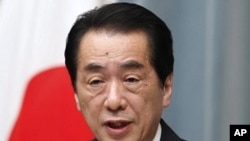Japan's prime minister says the situation is stabilizing at the crippled Fukushima nuclear power plant, even though his government has elevated the level of the crisis on an international scale.
Prime Minister Naoto Kan offered the assurances Tuesday in a nationally televised news conference, hours after his government designated the accident as a level seven - the highest level on the nuclear incident scale formulated by the International Atomic Energy Agency. That puts the Japanese crisis on the same level as the 1986 disaster at Chernobyl.
A series of strong aftershocks is hampering efforts to repair systems at the Fukushima-Daiichi plant, including a 6.0-magnitude quake Tuesday that forced workers to evacuate the site for the second time in two days. The plant's operators said there were no immediate signs of new damage from the aftershock, which followed a 6.2-magnitude quake on Monday.
Despite those assurances, China on Tuesday again voiced concern over Japan's move to discharge nuclear wastewater from Fukushima's crippled reactors into the Pacific. China's official Xinhua news agency reported that Chinese Premier Wen Jiabao talked Tuesday by telephone with Japanese Prime Minister Naoto Kan, and demanded that the Japanese government "pay high attention" to the impact that such discharges have on the marine environment.
The report said Wen also urged the Japanese leader to adhere to related international law, and to "promptly and accurately" inform China of new developments.
Japan raised the crisis from a five to a seven on the international scale, indicating a major accident with widespread health and environmental effects. But officials stressed that radiation released since an earthquake and tsunami destroyed the plant's cooling systems on March 11 is only one-tenth of the radiation released at Chernobyl.
Chief Cabinet Secretary Yukio Edano said that, unlike the Chernobyl disaster in what is now Ukraine, so far there has been no "direct health hazard" from the Fukushima accident. The Chernobyl disaster is believed to have killed about two dozen people within days and thousands more over the ensuing years.
Safety agency officials also noted that in Chernobyl, radiation spread over a wide area when a reactor exploded. So far at Fukushima, most of the radiation has been contained within large concrete chambers, though they may be leaking.
Kan used his news conference to stress that the levels of radiation leaking from the plant are now decreasing and that the situation is moving "one step at a time" toward stability.
He also said it is time for the country to turn to the task of reconstruction and said the Japanese people must regain the determination shown in rebuilding the country after World War II. He said Japan should not just restore things as they were, but use the twin disasters as impetus to build a better future.
The prime minister additionally urged citizens to abandon the consumer restraint shown out of respect for the victims of the March 11 earthquake and tsunami, which has left about 28,000 people dead or missing. He said they should instead help survivors by buying goods from the areas most affected by the disasters.
Some information for this report was provided by AP, AFP and Reuters.




